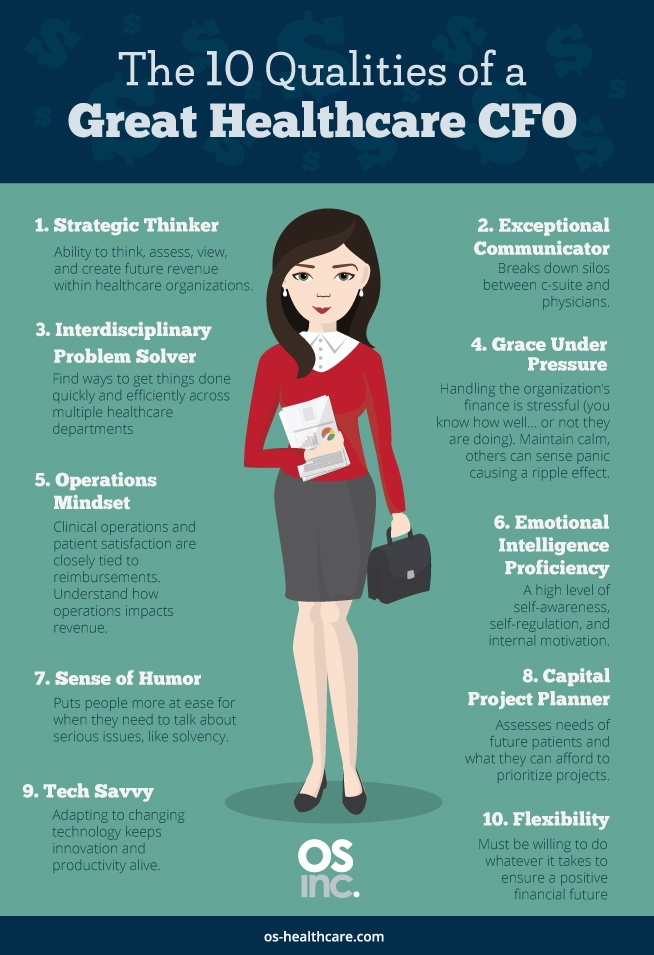The role of a chief financial officer in today's dynamic healthcare landscape has evolved from a chief controller into a more strategic position overseeing many different parts of the organization — including compliance, finance, and risk management. In a 2015 survey of global CEOs by KPMG, 63% of the surveyed CEOs believe that the CFO’s role will continue to increase in significance over the next three years.
What does it take to be a great hospital or health system CFO? It's a special blend of these 10 qualities.
- Strategic Thinker
Every healthcare CFO is tempted to deal with what's directly in front of them (declining patient volumes, increased A/R, transitioning to value-based reimbursement, etc.), because it always seems more urgent and important. Unfortunately, this temptation puts your healthcare organization at risk. Chief financial officers who can anticipate, think critically, interpret and navigate the current healthcare climate set their healthcare organization up for long-term success financially.
- Exceptional Communicator
Communication is important in every role in healthcare. CFOs need to be able to listen and communicate their message effectively from the clinical staff level up to the CEO. Exceptional communication skills foster relationships, break down departmental silos and open lines of communication between administration and physicians.
- Interdisciplinary Problem Solver
Great CFOs find ways to get things done despite the strict regulatory environment of healthcare. They look for interdisciplinary solutions — By understanding the complexity of relationships between different departments they can develop a cross functional approach that increases their financial profitability.
- Grace Under Pressure
Hospital staff look to the Chief financial officer as someone who even in troubled times understands the organization’s financial health and makes decisions rationally. Staying calm under pressure ensures productivity doesn't drop and a calm environment will exist within your hospital or healthcare organization.

- Operations Mindset
Understanding clinical and quality operations, even at a basic level is a must for healthcare CFOs. Mark Bogen, CFO of South Nassau Communities Hospital, believes "quality, patient satisfaction and patient safety are all tied into reimbursement, and a CFO is misinformed if he or she doesn't get involved heavily in those other areas." CFOs with an operational mindset are more informed decision makers and are more likely to put your organization in a position of strength.
- Emotional Intelligence Proficiency
Emotional intelligence is essentially the way a person perceives, understands, expresses, and manages emotions. It's more than the latest buzzword; possessing a high level of emotional intelligence is a key indicator of future success. CFOs with higher levels of emotional intelligence actually perform better in their roles at healthcare organizations.
- Sense of Humor
Healthcare and finance are both serious, humor lightens the mood, the saying "laughter is the best medicine" rings true for CFOs. Laughter decreases stress and can put employees at ease, if the situation allows add humor.
- Capital Project Planner
According to F. Morgan Gasior, CEO of BankFinancial, "CFOs are leading the charge in the effective deployment of capital." Managing capital projects and making decisions on what can be afforded and how it will assess the needs of the community is crucial to long-term sustainability. It's a delicate financial balance of making the most out of your current resources and knowing when to invest in upgrades to your technology/equipment/facility.

- Tech Savvy
Technology is always changing. Electronic health records, online appointment scheduling/patient billing software and other revenue cycle management tools increase efficiency and spur hospital innovation. Tech savvy CFOs are no longer "nice to find" but a necessity. Hospitals and healthcare systems need CFOs who see the value of technology, whether it for increasing staff productivity, enhancing patient experience, or submitting clean claims to boost revenue.
- Flexibility
Healthcare CFOs need to be flexible yet decisive. Their decisions have a hand in shaping the future of a healthcare organization — a great CFO understands what works today may not work tomorrow and can identify when changing courses makes financial sense. Even though their primary responsibility will always be to achieve financial success for their hospital or health system. The decisions a CFO makes to reach that goal shouldn’t be as set in stone.


